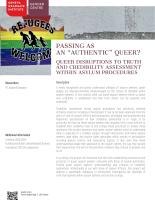Funding organisation: Swiss National Science Foundation (SNSF)
Timeline: 2022-2025
Budget: CHF 202,224
Keywords: credibility, truth, asylum, migration, queerness, gender and sexuality
Background
In political discourse around the world, asylum seekers are increasingly considered a menace, as deceitful economic migrants who deserve to be treated with suspicion. Moreover, they are considered the perpetrators, not the survivors, of violence. Asylum systems have in response developed sophisticated methods to eliminate “bogus” asylum seekers. But these techniques for credibility assessment do not affect all categories of asylum seekers in a uniform fashion.
Research Focus
This project concentrates on credibility assessment within asylum procedures involving queer asylum seekers in Switzerland. On the one hand, queer people – or people with a non-normative sexual orientation, gender identity and expression, or sex characteristics, to use administrative terms – are now legally recognised to comprise a “particular social group,” and people belonging to it can claim asylum on the grounds that they face credible (fear of) persecution for their queerness. On the other hand, asylum procedures function on a presumption of bad faith, where the onus is on the asylum seeker to provide evidence of their account. As such, they impose a heavier burden of proof on queer asylum seekers, who must convince authorities not only of the (fear of) persecution they have faced, but also of their queerness itself, a profoundly intimate and often slippery facet of one’s identity.
We must therefore ask, how do queer asylum seekers navigate this peculiar predicament? This project will attempt to respond to this question with a rich ethnographic account of queer asylum seekers’ attempts to prove their identities and produce the “truth of sex.” The ethnography will also illuminate how they respond to the collision between their truth-establishing conventions (vocabulary, body language, documents?) and those established within asylum systems. It will aim to unsettle the centrality of truth and credibility assessment within asylum procedures, and aspire to displace truthfulness – which is impossible to objectively ascertain and therefore easy to contest – as a virtue upon which the fates of asylum seekers hinge. Exploring asylum seekers’ imagined alternatives to notions of truth circulating within asylum systems, which invalidate their experiences of queerness and persecution, the research output will be of relevance for anthropologists and social scientists interested in debates around migration and sexuality, as well as practitioners advocating the rights of queer asylum seekers.
The following specific questions will guide this research:
- What alternatives do queer asylum seekers imagine to the conventions of producing truth and techniques for determining credibility on which asylum procedures currently operate?
- What do queer asylum seekers have to say about “expert” opinion on credibility determination criteria for queer asylum seekers (see for example the Discrimination, Shame, Stigma, and Harm i.e. DSSH model)?
- Finally, where many have asked whether asylum officials and the general public can trust asylum seekers, what would we learn by asking whether asylum seekers can trust asylum officials, what a truth-centric asylum system demands of asylum seekers?
Methodological Note
The ethnography will draw on data collected through the course of 15 months of fieldwork, which will involve deep hanging out and semi-structured interviews. The fieldwork will be conducted within Swiss associations that support queer asylum seekers and refugees.
With support from the Swiss National Science Foundation.





